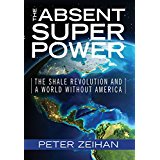Shale Security
| America’s path to Energy Independence is taking place through myriad advances in hydrocarbon output, driven by the many advantages we possess. In America Is Great! we noted the benefits of America’s energy sector’s large skilled labor force, access to capital, culture of entrepreneurialism, constant drive for productivity improvements, ready availability of water, vast network of infrastructure and private ownership of mineral rights as key elements driving the Shale Revolution.
Take a step back though and consider the broader implications of an America no longer reliant on foreign sources of energy. We can all be armchair geopolitical analysts as we ponder the ramifications. Peter Zeihan has done just this in his latest book, The Absent Superpower: The Shale Revolution and a World Without America. It follows up on his previous 2014 book, The Accidental Superpower: The Next Generation of American Preeminence and Coming Global Disorder, and contemplates the shifting alliances and security needs of both world and regional powers. They were published a couple of years apart, and the world had changed only somewhat during this intervening period which results in certain sections appearing as if they would be at home in either book.
Absent Superpower, the more recent volume, is worth reading just for Part I: Shale New World. Zeihan runs through an absorbing account of shale drilling including its history, numerous technological advances and why America is pretty much the only game in town. He then moves from energy sector expert to examine the broader global implications. Geopolitical trends can unfold at the pace of demographic change, which is to say they’re fascinating to look back on but not likely to drive investment returns over anything shorter than multi-year intervals. An America secure in its energy needs can more readily disengage from maintaining the global security order. War in the Middle East and a disruption in crude oil shipments would still harm us, but not nearly as much as in the past. Since World War II, America has acted on its interests but has often defined those interests broadly enough so as to include spreading democracy and free markets around the globe. Although Absent Superpower was finished before the 2016 election, Zeihan identifies the growing populism which demands clearer payback for the application of American power. If we care less about the rest of the world, or acknowledge limitations on our ability to right every wrong, the resulting power vacuum will draw in others. Here Zeihan embarks on a series of specific and invariably violent forecasts of armed conflict (“the Disorder”), most notably between Russia and its European neighbors. This is driven by Russia’s need for the coherent geographical borders that made the former Soviet Union more easily defensible than allowed in its shrunken form today. Such precise expectations are almost guaranteed to be wrong; Zeihan clearly hasn’t studied Behavioral Finance, which shows that humans often have unreasonably high confidence about their predictions, whether of stock returns or the number of jellybeans in a jar. And disappointingly, although perhaps unsurprisingly given the rapid publication of his second book after the first, themes and arguments are repeated in Absent Superpower to the frustration of one who’s read both. Zeihan works his underlying theme, which is that Geography and Resources are Destiny, to explain much of human history in ways that are often compelling. He fearlessly builds on his conclusions to make sweeping forecasts. However, he’s virtually certain to be wrong in specifics. For example, consider the following, “…the British Navy will sink the entirety of the one Russian naval force that might have been able to sail to the Baltic warzone; the Northern Fleet, based near Murmansk” It’s hard to imagine this happening without the subsequent use of nuclear weapons, which both antagonists possess but Zeihan ignores. Later, he describes, “the East Asian Tanker War” with “Japan and China the primary competitors.” So pass these off as speculative prose reflective of just a couple among many possibilities. On more solid ground, Zeihan graphically illustrates the shifting flows of trade in hydrocarbons, with North America eventually dropping imports from west Africa and the Middle East in favor of supplies at home. A less engaged America, secure in its resources and defense, responding to political shifts that demand greater attention at home, seems highly likely. Zeihan describes the United States as, “the only power with global power and global reach…but…without global interests.” A critical supporting pillar of this evolving stance is energy independence. So while the future is always uncertain, it does seem reasonable to assign a value to domestic hydrocarbons greater than their pure economic one. In other words, national security and the Shale Revolution are far more intertwined than you might think. Quickly approving the Dakota Access and Keystone XL pipelines are examples of the new Administration making decisions that fit within the type of policy framework described. The rolling back of regulations that impede domestic energy similarly fall within the same sphere. The White House has published An America First Energy Plan which leads with the goal of maximizing, “…the use of American resources, freeing us from dependence on foreign oil.” In this new world, a bet on public policy being increasingly supportive of the domestic energy sector seems like a good one. |
